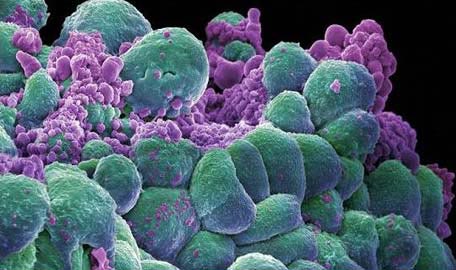Detection of protein strains can prevent cancer
Scientists have likened these proteins to leeches, able to attach themselves to other proteins. They play a decisive role in repairing DNA damage that can lead to cancer.

The study was conducted on breast cancer cells.
Source: cancerandcommunication.at
This breakthrough was carried out by two independent research teams and published in the journal Nature.
They hope the discovery could open a new path to making treatment drugs that kill cancer cells and promote the production of healthy cells instead.
These proteins seem to be capable of excelling in damaged areas of the body.
Protein SUMO (Small Ubiquit-like Modifier) tracks and traces areas of the body that show DNA damage. They attach themselves to normal proteins and instruct these proteins to repair genetic damage.
Using this method, proteins can repair even the breaks in the double strand of DNA, one of the most serious DNA damage.
When the repair is complete, the SUMO proteins will separate and continue to repair other DNA damage.
Test on breast cancer gene
A research team followed the repair process that took place on the BRCA1 gene. According to scientists, the damage on this gene can lead to a very high risk of breast cancer.
SUMO is attached to a damaged BRCA1 gene, correcting it, helping to prevent breast cancer from forming.
Researcher Dr. Jo Morris of Imperial College London said: 'This new understanding is the first step towards developing a drug that can protect normal cells from the effects of chemotherapy or have. can improve the effectiveness of current breast cancer treatments'.
Dr. Lesley Walker of the British Cancer Research Institute, one of the research funding agencies, said: 'DNA damage, especially ruptures in double-stranded DNA, is one of the major causes. The risk of cancer is weak and we know that people with mutations in the BRCA1 gene are at risk for some very high cancers. '
'The discovery of SUMO proteins that play an important role in repairing DNA damage can provide a new opportunity to quell the development of cancers.'
But she added: 'This is an extremely complicated and complicated biological process, so it may take years for us to apply these insights to intervene safely and Help treat cancer patients'.
- Detection of FAP proteins related to cancer
- Detection of the protein that causes palate cancer
- Scientists who find proteins can prevent metastatic cancer
- Find a way to prevent metastatic cancer
- Protein discovered to prevent stomach cancer from spreading
- Find out how to detect cancer early
- Detection of proteins related to pancreatic cancer
- The mystery of alien strains is already on Earth
- New compounds prevent the development of cancer
- What is protein thermal shock? Can proteins help us fight cancer?
- Electronic chips can detect cancer early
- Google developed a cancer detection device
 Why do potatoes have eyes?
Why do potatoes have eyes? 'Tragedy' the world's largest carnivorous life: Death becomes ... public toilet
'Tragedy' the world's largest carnivorous life: Death becomes ... public toilet Tomatoes were once considered 'poisonous' for 200 years
Tomatoes were once considered 'poisonous' for 200 years Detecting microscopic parasites on human face
Detecting microscopic parasites on human face